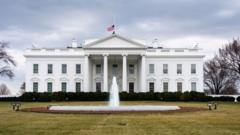**Critics warn of potential fallout as federal assistance pauses for review, impacting various support initiatives.**
**White House Freezes Federal Aid Amid Political Tensions**

**White House Freezes Federal Aid Amid Political Tensions**
**Acting OMB Chief's Memo Spurs Concerns Over Essential Programs**
In a surprising political development, the White House has temporarily suspended federal grants, loans, and other forms of federal assistance as confirmed by a leaked memo, verified by CBS News. The acting head of the Office of Management and Budget (OMB), Matthew Vaeth, has urged government agencies to reassess their expenditures in light of priorities outlined by President Donald Trump.
While the memo specifies that critical programs like Medicare and Social Security benefits will remain intact, the broader implications of the funding freeze are not fully understood. This move comes on the heels of the Trump administration's decision to halt near-total foreign aid, drawing ire from a number of Democratic leaders who foresee "devastating consequences" for programs vital to many citizens, including cancer research, food assistance initiatives, and mental health resources like suicide hotlines.
The administration seeks to inspect all financial assistance related to foreign aid, NGOs, diversity initiatives, and environmental endeavors. Agencies have been given a deadline of 17:00 EST (22:00 GMT) to cease awarding new funds and disbursing existing ones, with a requirement to report all paused programs by February 10.
Democratic leaders wasted no time in articulating their discontent, with Senate Appropriators Patty Murray and Rosa DeLauro drafting a letter to the White House calling the decision "breathtaking" and emphasizing its unconstitutional nature. Senate Minority Leader Chuck Schumer further condemned the halt, stating, "Congress approved these investments and they are not optional; they are the law." He warned that the repercussions of this freeze would lead to chaos, affecting everything from university funding and rent payments to services offered by non-profit organizations.
This pause follows an internal communication from the Department of State, which froze nearly all existing foreign assistance, aside from emergency food aid and military funding for Israel and Egypt, indicating a significant shift in the U.S. foreign aid agenda. Notably, the U.S. is a leading international donor, having allocated $68 billion in aid in 2023 alone. As the situation evolves, tensions between the Trump administration and congressional Democrats continue to mount, suggesting ongoing legal and political battles ahead.
While the memo specifies that critical programs like Medicare and Social Security benefits will remain intact, the broader implications of the funding freeze are not fully understood. This move comes on the heels of the Trump administration's decision to halt near-total foreign aid, drawing ire from a number of Democratic leaders who foresee "devastating consequences" for programs vital to many citizens, including cancer research, food assistance initiatives, and mental health resources like suicide hotlines.
The administration seeks to inspect all financial assistance related to foreign aid, NGOs, diversity initiatives, and environmental endeavors. Agencies have been given a deadline of 17:00 EST (22:00 GMT) to cease awarding new funds and disbursing existing ones, with a requirement to report all paused programs by February 10.
Democratic leaders wasted no time in articulating their discontent, with Senate Appropriators Patty Murray and Rosa DeLauro drafting a letter to the White House calling the decision "breathtaking" and emphasizing its unconstitutional nature. Senate Minority Leader Chuck Schumer further condemned the halt, stating, "Congress approved these investments and they are not optional; they are the law." He warned that the repercussions of this freeze would lead to chaos, affecting everything from university funding and rent payments to services offered by non-profit organizations.
This pause follows an internal communication from the Department of State, which froze nearly all existing foreign assistance, aside from emergency food aid and military funding for Israel and Egypt, indicating a significant shift in the U.S. foreign aid agenda. Notably, the U.S. is a leading international donor, having allocated $68 billion in aid in 2023 alone. As the situation evolves, tensions between the Trump administration and congressional Democrats continue to mount, suggesting ongoing legal and political battles ahead.






















